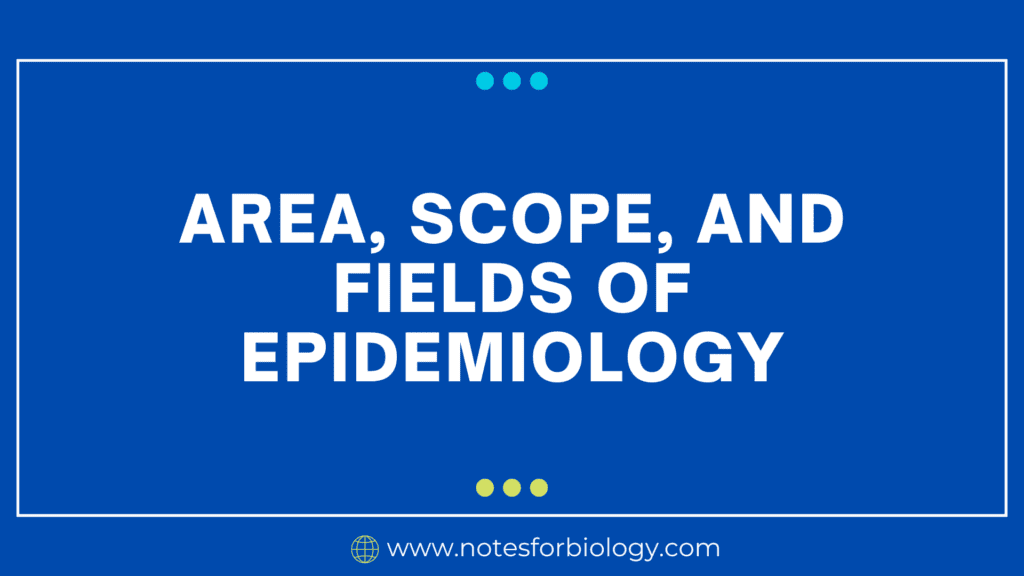Epidemiology is a critical scientific subject that investigates the distribution and causes of health-related states or events within specific populations, with the goal of using this information to control and prevent health issues. Its broad scope of study includes infectious and chronic diseases, injuries, environmental health concerns, and genetic variables. It covers a wide range of topics, including descriptive and analytical research, public health surveillance, risk assessment, and policy creation. Furthermore, the field connects with a number of specialist areas, including molecular and genetic , clinical and veterinary , and global health, all of which use epidemiological methodologies to solve different health concerns. It advances public health by taking a holistic approach to disease dynamics.
Table of Contents
What is Epidemiology?
It is the study of the distribution and determinants of health-related states or events in specific groups, as well as the use of this knowledge to manage health problems. It is the study of the distribution and causes of health-related states or events in specific groups, as well as the use of this knowledge to address health problems. Understanding how illnesses spread, identifying risk factors, and devising prevention and control techniques are all part of the process, with the ultimate goal of improving public health.
Areas
It studies a wide range of health and illness issues, such as:
Infectious Diseases: Understanding and managing outbreaks, pandemics, and endemic diseases.
Chronic Diseases: Research into noncommunicable diseases such as cancer, cardiovascular disease, diabetes, and mental health disorders.
Injuries: Investigating the causes and prevention of injuries, both deliberate and unintentional.
Environmental Health: Investigating the effects of environmental exposures on health, such as pollution, radiation, and workplace risks.
Genetic: The study of how genetic factors influence health and disease.
Social: The study of the social determinants of health, such as socioeconomic position, education, and housing.
Nutritional: The study of the link between diet, nutrition, and health outcomes.
Pharmacoepidemiology: The study of drug usage and its effects in large populations.
Health services research: Involves assessing the effectiveness, efficiency, and equity of health services and interventions.
Epidemiology as an Interdisciplinary Subject
It is an interdisciplinary field that brings together numerous scientific and social disciplines to provide a thorough understanding of health issues. Key contributions include:
Biological Sciences
Microbiology and Immunology: Investigate pathogens and immunological responses.
Genetics: Investigate genetic predispositions and environmental interactions.
Pathology: Investigate disease processes at the cellular level.
Public health
Health Promotion: Create programs that encourage healthy habits.
Health Policy: Use epidemiological data to inform policy decisions.
Health Services Research: Evaluate the effectiveness and equity of health-care services.
Social sciences
Sociology: The effects of social systems on health.
Psychology: Behavioral aspects that affect health, such as stress and lifestyle.
This interdisciplinary approach increases our ability to successfully treat complex health challenges.
Scopes
It covers a variety of tasks and applications, including:
Descriptive epidemiology: The study of the distribution of diseases over time, space, and person in order to find patterns and trends.
Analytical Epidemiology: The study of the causes and relationships of health-related states or occurrences using observational (cohort, case-control, and cross-sectional studies) and experimental (randomized controlled trials) methods.
Public health surveillance: The monitoring and collection of data on illness incidence and prevalence to guide public health decisions and policies.
Field epidemiology: Entails conducting investigations and interventions during acute outbreaks and public health crises.
Risk assessment: Involves identifying and measuring risk factors for diseases and health outcomes in order to inform prevention and control efforts.
Evaluation: Involves determining the impact and efficacy of public health treatments and programs.
Policy development: Entails using epidemiological evidence to guide and inform public health policies and regulations.
Education and Training: Health workers are taught and trained in epidemiological methodology and public health practice.
Fields
It is a multidisciplinary field that intersects with many other disciplines, resulting in specific fields of study:
Molecular epidemiology: The application of molecular biology tools to epidemiological investigations in order to gain a better understanding of disease mechanisms at the molecular level.
Genetic epidemiology: The study of the genetic basis of diseases and how genetic and environmental variables interact.
Clinical epidemiology: The application of epidemiological methodologies in clinical settings to improve patient care and results.
Veterinary epidemiology: The study of the spread and causes of diseases in animal populations, which can have an impact on human health.
Occupational epidemiology: studies the health impacts of workplace exposures and environments.
Environmental epidemiology: The study of how environmental elements such as air and water pollution, toxins, and climate change affect human health.
Social epidemiology: Investigates how social structures and environments affect health outcomes and inequities.
Behavioral epidemiology: The study of how behaviors (such as smoking and physical exercise) influence disease development.
Global health epidemiology: The study of health issues that span international borders and affect people all over the world.
In conclusion, epidemiology is a big and complicated subject that studies a wide range of health disorders and their determinants. Its vast reach include descriptive and analytical methodologies, public health surveillance, risk assessment, and policy formation, all with the goal of regulating and avoiding health problems. Its’ interdisciplinary nature is highlighted by its diverse domains, which range from molecular and genetic studies to global health and social causes. By combining information and techniques from several disciplines, it provides a complete framework for understanding and improving public health, making it a vital instrument in the battle against disease and health promotion around the world.
Frequently Asked Questions (FAQ)
What is epidemiology?
Epidemiology is the study of the distribution and determinants of health-related states or events in specific groups, as well as the use of this knowledge to manage health problems.
Why is epidemiology important?
Epidemiology is critical for identifying disease risk factors, driving public health policies and treatments, managing outbreaks, improving health care, and ultimately improving population health.
How do epidemiologists gather data?
Epidemiologists collect information using a variety of approaches, including surveys, medical records, laboratory tests, and public health monitoring systems.
Related Articles

